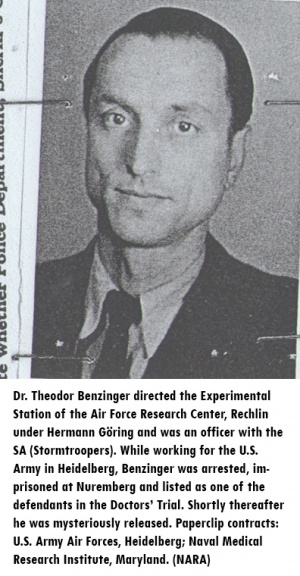Difference between revisions of "Theodor Benzinger"
m (Text replacement - "|WP=https://" to "|wikipedia=https://") |
(a) |
||
| Line 4: | Line 4: | ||
|image=Theodor Benzinger.jpg | |image=Theodor Benzinger.jpg | ||
|birth_name=Theodor Hannes Benzinger | |birth_name=Theodor Hannes Benzinger | ||
| + | |amazon=https://www.amazon.com/Theodor-H.-Benzinger/e/B001KIQGPY/ | ||
|birth_date=23 August 1905 | |birth_date=23 August 1905 | ||
|birth_place=Stuttgart, Germany | |birth_place=Stuttgart, Germany | ||
Revision as of 00:11, 4 July 2017
(researcher) | |
|---|---|
 | |
| Born | Theodor Hannes Benzinger 23 August 1905 Stuttgart, Germany |
| Died | 26 October 1999 (Age 94) Bethesda, Maryland, USA |
| Alma mater | University of Tübingen, University of Munich, University of Berlin |
| Spouse | Maria Benzinger |
Contents
Background
Benzinger graduated after completing his school career at the Universities of Tübingen, Munich and Berlin to study medicine and the natural sciences. He gained a Ph.D. et med.[1]
Career
In 1933 Benzinger became a member of the NSDAP and SA and signed the Bekenntnis der deutschen Professoren zu Adolf Hitler. He worked under Hermann Rein in 1934 at the Physiological Institute of the University of Göttingen. His 'Habilitation' took place 1938 at the Medical Faculty of the University of Göttingen with the subtitle "Studies on the breathing and the gas metabolism, especially with a lack of oxygen and vacuum, with ongoing direct recording methods". Over the next decade and throughout World War II, Dr. Benzinger, who was also a test pilot, researched issues like decompression and high-altitude physiology. He discovered, for example, that it is air embolisms that sometimes cause death in explosions.[2]
World War II
During the Second World War Benzinger initiated in 1940, the Aeromedical Institute of the test center at Rechlin, which was subordinated to the Ministry of Aviation. His work and research priorities were breathing physiology, height adjustment, thermal regulation and desalination research. Benzinger participated in the session on medical issues in distress 'Winter Death' on February 26th and 27th 1942 in Nuremberg, where it was referenced using the "supercooling experiments" at Dachau. In the German Academy for Aviation Research, he was a corresponding member and published several scientific papers in the writings of the German Academy of Aeronautical Research. Benziger was promoted to Obermedizinalrat.[1]
Arrest
After the war, Benzinger worked for Medical Research in Heidelberg at the Kaiser Wilhelm Institute, where he was arrested in September 1946 and his name was added as a defendant in the Doctors Trial[citation needed]. He was later released without legal process after a few months.
Transfer to USA
As part of Operation Paperclip Benzinger in 1947 was transferred to Randolph Air Force Base.[1] Benzinger was Director at the Bioenergetic Institute of Naval Medical Research Institute (NMRI) in Bethesda, a position he held until 1970. Afterwards he worked for four years at the National Institute of Standards and Technology in Gaithersburg, where he developed the Planck-Benzinger equation, which modified the second law of thermodynamics.[2]
Patents
Benzinger had patents on various inventions, his most commercially important was the ear thermometer, which he patented in 1964.
Family
Benzinger, who in 1955 was an American citizen, was married and had four children.